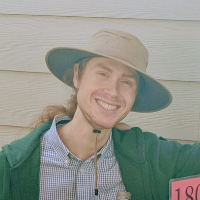
Tháng 4 là Tháng tri ân tình nguyện, và trong suốt tháng này, chúng tôi thể hiện lòng biết ơn và tôn vinh tất cả các tình nguyện viên tuyệt vời của mình! Trong năm học 2020-21, chúng tôi đã chuyển đổi các chương trình tình nguyện của mình sang hoàn toàn trực tuyến. Tất cả chúng tôi đều đã thích nghi với môi trường học tập trực tuyến mới này. Chúng tôi biết ơn nhiều cố vấn và Huấn luyện viên lớp học Toán đã chấp nhận thử thách và tiếp tục phục vụ học sinh của Austin ISD! Trong phần Hỏi & Đáp này, chúng tôi đã trò chuyện với hai tình nguyện viên của mình, Matt Rodriguez và David Stern, về trải nghiệm làm tình nguyện trực tuyến của họ. Khi chúng tôi kết thúc năm học, chúng tôi vô cùng biết ơn họ và tất cả các tình nguyện viên tuyệt vời của chúng tôi vì những nỗ lực của họ trong năm nay!
Matt Rodriguez | Huấn luyện viên lớp toán
H: Bạn đã làm tình nguyện được bao lâu rồi?
A: Tôi đã làm công việc hướng dẫn lớp học kể từ học kỳ mùa thu năm 2010, khi tôi làm việc cho APIE với tư cách là thực tập sinh đại học.
H: Hoạt động tình nguyện trực tuyến có ý nghĩa thế nào với bạn?
A: Hoạt động tình nguyện năm nay có đôi chút khác biệt, nhưng không khác biệt toàn diện so với những năm trước. Dạy kèm trực tuyến tiện lợi hơn đối với tôi, nhưng tôi nhớ cảm giác được gặp trực tiếp học sinh và kết nối với các em ở mức độ cá nhân hơn. Tuy nhiên, nhìn chung, điều đó không làm thay đổi động lực làm tình nguyện của tôi hoặc cảm giác hoàn thành mà tôi chia sẻ với học sinh.
H: Bạn đã thích nghi thế nào với công việc tình nguyện trực tuyến?
A: 3-5 lần đầu tiên rất khó khăn, nhưng tôi nghĩ giờ tôi đã quen rồi. Việc không thể trình bày toán học bằng bút và giấy rất khó khăn, nhưng nó buộc tôi phải rèn luyện kỹ năng giao tiếp bằng lời nói và sử dụng tất cả các công cụ mà Zoom cung cấp.
Q: Bạn hy vọng sẽ có tác động gì đến học sinh của mình?
A: Như mọi năm, mục tiêu của tôi là cho học sinh thấy toán học hữu ích và dễ tiếp cận. Tôi muốn các em biết rằng toán học không chỉ dành cho "mọt sách", mà còn hữu ích trong nhiều lĩnh vực nghề nghiệp và cuộc sống hàng ngày, và bất kỳ ai sẵn sàng bỏ ra một chút công sức đều có thể hiểu và áp dụng được.
H: Bạn nghĩ học sinh cần gì ở tình nguyện viên trực tuyến trong thời gian này?
A: Năm nay, tôi nghĩ học sinh đang tìm kiếm cảm giác bình thường và nhịp điệu. Tôi cố gắng luôn có mặt và hướng dẫn như thể tôi đang ở đó với các em trực tiếp.
H: Bạn đã học được điều gì có hiệu quả khi tham gia hoạt động tình nguyện trực tuyến?
A: Đối với việc kèm cặp trực tuyến, tôi phải nói chậm lại và nhắc lại các khái niệm nhiều lần, đôi khi bằng các từ khác nhau. Tôi cũng cố gắng nhập từ vựng toán học vào cuộc trò chuyện hoặc chú thích trên các slide để học sinh có thể thấy những gì tôi đang nói. Tôi thấy rằng học sinh phản hồi nhiều hơn với các câu hỏi được đặt ra trong cuộc trò chuyện thay vì chỉ hỏi to. Học sinh hiếm khi bật màn hình hoặc tự bỏ tiếng, nhưng các em thường sẵn sàng giao tiếp qua cuộc trò chuyện. Tôi đã học cách chấp nhận điều đó và đã cố gắng tập trung giao tiếp của mình thông qua tính năng trò chuyện.
 David Stern | Người cố vấn
David Stern | Người cố vấn
H: Bạn đã làm tình nguyện được bao lâu rồi?
A: Tôi đã làm tình nguyện từ tháng 1 năm 2019. Hiện tại tôi có ba người được hướng dẫn trong 1st lớp 7thứ tự lớp, và 9thứ tự cấp.
H: Quá trình chuyển đổi sang hình thức ảo diễn ra như thế nào đối với bạn?
A: Thật không may, tôi đã mất liên lạc với một trong những người được tôi hướng dẫn kể từ khi tôi bắt đầu vào năm 2019. Tôi nhớ anh ấy và không thể tưởng tượng được anh ấy sẽ như thế nào khi bắt đầu học trung học trong bối cảnh này. Tôi có một người được hướng dẫn mới ở cùng vị trí với anh ấy và chúng tôi đã gặp nhau thường xuyên trước khi chuyển lại vào lớp học. Thật tuyệt khi được biết anh ấy, mặc dù chúng tôi chưa bao giờ gặp nhau trực tiếp. Người được tôi hướng dẫn đáng tin cậy nhất mà tôi từng có là 1st giáo viên chấm điểm đến mỗi tuần với rất nhiều năng lượng. Tôi nhớ việc được gặp trực tiếp bọn trẻ và tôi hy vọng chúng ổn.
Q: Bạn hy vọng sẽ có tác động gì đến học sinh của mình?
A: Cố gắng cho họ thấy rằng tôi quan tâm và tôi ở đây vì họ, và bất cứ điều gì họ muốn nói, tôi đều muốn nói. Luôn xuất hiện và có mặt là điều tốt nhất chúng ta có thể làm; Tôi cố gắng cho họ thấy rằng tôi không có mục đích gì ngoài việc chỉ ở đó vì họ.
H: Bạn đã học được điều gì có hiệu quả khi tham gia hoạt động tình nguyện trực tuyến?
A: Khi chúng ta có thể gặp nhau, tôi không có chương trình nghị sự. Điều quan trọng là phải có thái độ tốt và hỏi họ những câu hỏi siêu mở và theo dõi bất cứ điều gì đã xảy ra kể từ lần cuối chúng ta gặp nhau. Nó trở nên ít có cấu trúc hơn vì họ đã quen với cách tôi thu hút họ, vì vậy việc thay đổi, không có chương trình nghị sự và ghi nhớ các chi tiết để theo dõi là rất quan trọng.
H: Bạn thích nhất phần nào khi đăng nhập mỗi tuần?
A: Tôi nhận được rất nhiều từ điều đó. Chỉ cần xuất hiện vì họ cũng có ý nghĩa rất lớn đối với tôi. Tôi cố gắng hiểu được suy nghĩ của họ và hiểu rằng có rất nhiều thứ nằm ngoài tầm kiểm soát của họ. Tôi nghĩ nếu tôi ở vị trí của họ, tôi sẽ muốn một người không có mục đích, người có mặt để lắng nghe. Việc lắng nghe về cuộc sống của họ và biết rằng họ đang nhận được điều gì đó từ cuộc sống đó có ý nghĩa rất lớn đối với tôi. Năng lượng và quan điểm của họ chính là giải thưởng.
Phỏng vấn được thực hiện bởi: Briana Kallenbach, Thực tập sinh truyền thông APIE



